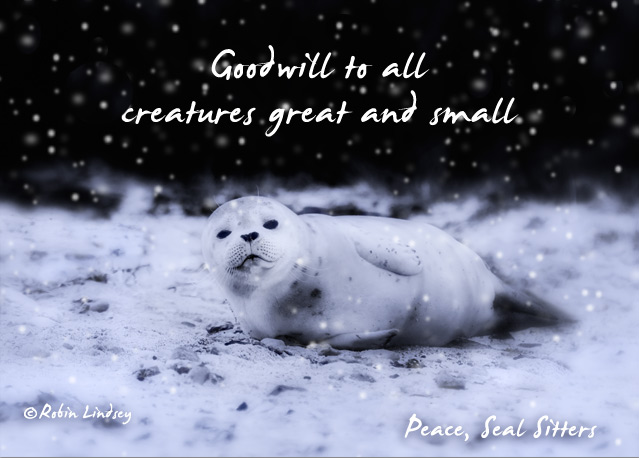"Pupdate" - recent flippered visitors to our shores
Sep/03/22 01:17 PM
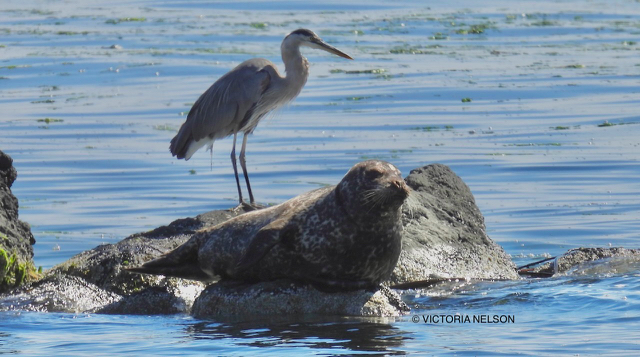 Augie on the rocks. Photo by Victoria Nelson
Augie on the rocks. Photo by Victoria NelsonAugie
Seal Sitters’ first seal in August has been nicknamed Augie by First Responder John S. Augie is a large adult male who for four weeks has been spotted lounging along Duwamish Head, the tide flats of Elliott Bay, the boat launch and the rocks south of Alki Point. Despite kayakers and beach goers approaching him closer than they should, Augie appears alert and healthy and able to escape at any time into the water.
First Responders Victoria and David H noted some wounds on Augie's nose and rear flippers. Dyanna Lambourn of WDFW commented, “The males, as they hold territories, get pretty beat up during this time of year. Especially their flippers and neck.” Adult males hauling out in West Seattle are a rare sight and Seal Sitters volunteers have been enjoying the opportunity.
 Cappuccino on the beach. Photo by David Hutchinson
Cappuccino on the beach. Photo by David HutchinsonCappuccino (Weatherwatch Park pup)
Over a period of three days, Seal Sitters hotline operators got reports of a seal hauling out at a small beach popular with kayakers, paddle boarders and sunset-watchers. First Responder Dave D hurried to the spot one evening but Cappuccino (nicknamed by volunteer Corinne) was already at the waterline and wiggled in before he could get a good look. The pup returned the next day; Suzanne and volunteers were able to protect and monitor her until dark. Nestled in the driftwood, the pup at first seemed to be in decent body condition, but by the third day, she was in marked decline - she was thin, lethargic and suffering from an infected facial wound.
The decision was made by First Responders Jay and Dori to take the little seal for treatment. Volunteers Kat and Corinne kept the crowd of onlookers informed of what was happening as Responder James captured Cappuccino. Dori reports that despite her condition Cappuccino “became quite lively at this maneuver and tried to snatch James’ hand, but fortunately we had no casualties tonight.”
At SR3’s marine hospital, Cappuccino was given antibiotics and formula, but after four days of rehab the feisty pup died of acute respiratory distress. Cappuccino is a sad reminder of how quickly a pup’s condition can deteriorate and how important it is to monitor the health of these animals.
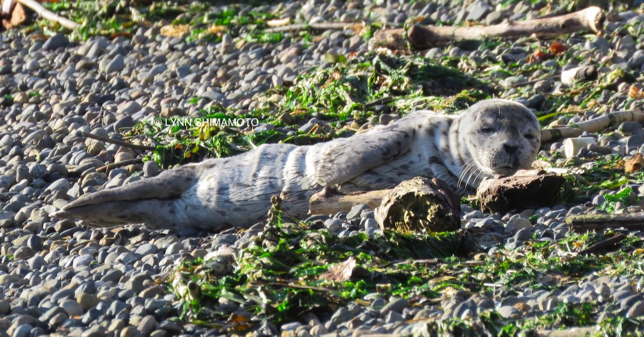 Virgo at Lincoln Park. Photo: Lynn Shimamoto
Virgo at Lincoln Park. Photo: Lynn ShimamotoVirgo
When First Responder Lynn got word of a pup at Lincoln Park on a Sunday afternoon from Hotline Operator Dana, they knew that managing beachgoers would be an immediate concern. When the responder arrived, she couldn’t believe a pup had hauled out amid the crowd of people. She located the seal only yards away from paddlers, picnickers and a professional photo shoot. Because the pup was so thin and young, it was quickly decided to take her in for care.
Once a response team was in place, First Responder Victoria scooped up the pup, named Virgo for the astrological sign when her care began at SR3. Virgo was found to have multiple infected puncture wounds on both rear flippers and left fore flipper. At SR3’s marine hospital in Des Moines, she was placed on antibiotics and anti-inflammatory medication. At first she was tube-fed and given subcutaneous fluids, but soon she began eating fish. SR3 reports Virgo “has been a champion feeder!”
Fingers crossed as Virgo continues to improve. Many thanks to Seal Sitters volunteer Jill for transporting Virgo to the hospital and to SR3 Veterinarian Michelle Rivard for taking care of the tiny pup.
Please call Seal Sitters’ hotline at 206-905-7325 (SEAL) for all reports of marine mammals on the beach.
Seal pups showing up in West Seattle again
Sep/01/22 01:06 PM
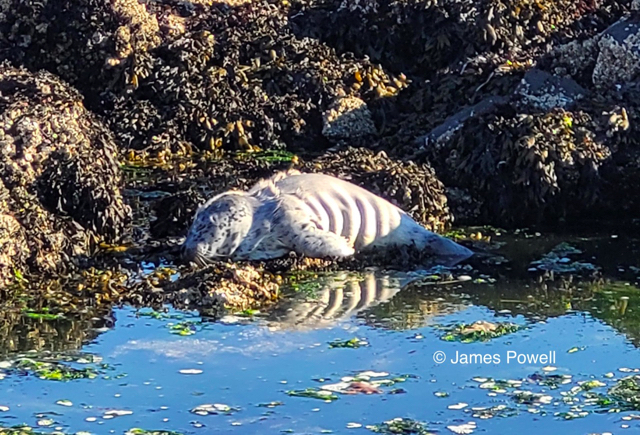 “Pisces” when first found on the beach. Photo: James Powell
“Pisces” when first found on the beach. Photo: James PowellIn early August, a call came to Seal Sitters reporting a harbor seal pup at Constellation Park. When she heard that the animal was calling out, the hotline operator was immediately concerned it was a nursing-age pup separated from its mother. First Responder James found the tiny animal below a rock jetty.
James says, “minutes after arriving, the first of two off-leash dogs came running up to where the seal was. Multiple RPs (reporting parties) reported . . . dogs on the beach all afternoon.” James watched the seal for an hour without seeing an attending female. Given the dogs, the growing crowd on the beach and the small size of the pup, he decided to take the pup, nicknamed Pisces, to the SR3 marine hospital.
At last report Pisces is doing well in care. The pup weighed only 7 kg at intake, while the ideal birth weight is 10 kg or more. She has been putting on weight and it’s reported that she ate her first live fish.
James is the Response Program Manager for SR3 and has been assisting Seal Sitters with beach response. As you may have heard, Seal Sitters is now in partnership with SR3, which is helping us with medical assessments, volunteer training and database services. Many thanks to SR3 for all the support.
Seal Sitters is still the Marine Mammal Stranding Network for West Seattle. Please continue to call Seal Sitters’ hotline at 206-905-7325 (SEAL) for all reports of marine mammals on the beach.
Seal pupping season is underway - give seals space
Jul/11/22 01:29 PM
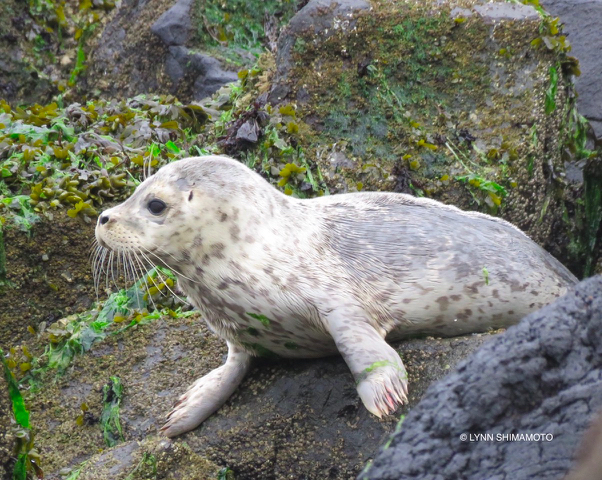
Rotund pregnant females can be seen hauled out on sandbars and rocky outcroppings, waiting to give birth. Seal moms with nursing newborns, along with pups that are newly weaned and independent, are resting on shore, log booms, private docks and marinas. For a map showing pupping seasons in the various regions of Washington state, click here.
DO NOT FEED, TOUCH OR MOVE SEAL PUPS - ALWAYS STAY BACK
Please be alert if you are strolling along ocean and Puget Sound beaches. On outer coast beaches that permit driving of motorized vehicles, be extra cautious - a tiny seal pup can look like a piece of bleached driftwood, easily run over and killed. If you come across a pup, please stay back and observe quietly from a distance. Contact the local stranding network. To learn more about NOAA Marine Mammal Stranding Network, click here.
It is normal for a seal pup to be alone on the beach - always keep dogs leashed and away. Stay back. Occasionally a mother harbor seal will leave her pup resting alone, returning to nurse. Or, if a pup was born on a dock or raft, often the pup cannot get back up onto the structure with mom and will end up on shore nearby. If there are people and dogs too close, she may abandon the pup. Most times, however, the pup will accompany mom to learn how to forage.
Once pups are weaned at 4-6 weeks, they will be all on their own, using shoreline daily to rest and warm up before returning to the water. Weaned seal pups need space to rest undisturbed as well. A pup that is scared into the water wastes precious calories - and this can truly be the difference between life and death. Seals of all ages rest on shore about 50% of their day. Undisturbed, stress-free rest is crucial to their survival. Visit Seal Sitters’ website to learn more about harbor seals.
STAY FAR AWAY FROM SEAL HAUL-OUTS TO PREVENT PUP ABANDONMENT
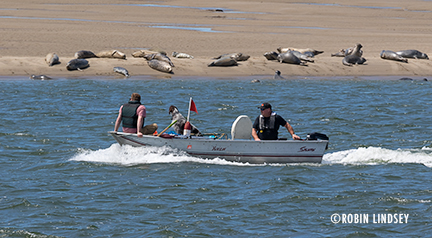
This is a reminder that when you venture out to the beach that marine mammals are protected by Federal Law. Always respect animals’ space and need for quiet. Stay back!
SUMMER AND FALL IS PRIME PUP TIME IN SOUTH PUGET SOUND
In South Puget Sound, seal pupping season usually begins in late-June and extends into the first week of September. As pups are weaned in area rookeries, they venture off to surrounding areas. West Seattle’s busiest months for newly weaned seal pups are September and October, but over the past few years, more lanugo (premature) and newborn pups have been seen here in June. These newborn pups in urban areas, like West Seattle lanugo pup Luigi (below), are highly likely to be abandoned because of human activity and off-leash dogs. A dog recently attacked a lanugo in our area. Always keep dogs leashed and away from seal pups.
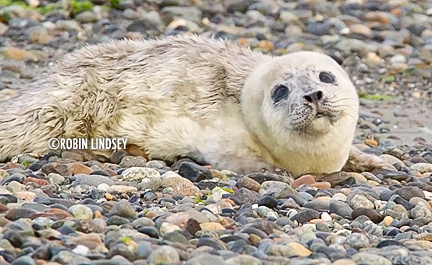
Please contact the stranding network to respond to a lanugo pup.
WHO TO CALL
If you see a pup alone onshore, stay back and notify your local Marine Mammal Stranding Network. In West Seattle, call Seal Sitters hotline @ 206-905-SEAL (9325). For other beaches, call the NOAA Stranding Hotline @ 1-866-767-6114 (or consult map link below for local networks info).
To find direct info on the network for your area, click the links for a map of stranding networks in the Pacific Northwest: Washington map | Puget Sound map | Oregon map
SEALS ARE PROTECTED BY LAW FROM HARASSMENT - RESPECT NATURE AND STAY BACK
Leave seal pups be - don’t touch, move or feed them. Please stay a minimum of 100 yards away from resting seals. Like all marine mammals, they are protected from harassment by the Marine Mammal Protection Act and Washington State law RCW 77.15.130 (a criminal misdemeanor, mandatory court appearance, punishable with up to 90 days in jail and up to $1000 fine).
Harassment or harm can be reported by calling NOAA Office for Law Enforcement’s hotline at 1-800-853-1964 (information may be left anonymously, but details are critical for enforcement purposes).
Pupping season brings waves of seal pups
Oct/05/21 03:10 PM
A September spate of weaned pups has signaled the start of pupping season in West Seattle. Seal Sitters hotline has recently been swamped with reports of seals on beaches stretching from Lincoln Park to Alki. September and October are typically the busiest months for seal pup responses in Seattle and South Puget Sound.
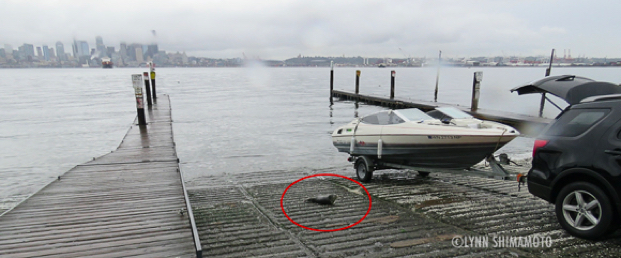 On one day alone, Seal Sitters First Responders scrambled to protect three young seals who were onshore. While one was resting at the far southern reaches of West Seattle in Lincoln Park, another, nicknamed Cutie, was found miles away lying in the middle of the boat ramp, just feet from a truck backing up with a trailer (photo above).
On one day alone, Seal Sitters First Responders scrambled to protect three young seals who were onshore. While one was resting at the far southern reaches of West Seattle in Lincoln Park, another, nicknamed Cutie, was found miles away lying in the middle of the boat ramp, just feet from a truck backing up with a trailer (photo above).
Because the pup was not intimidated and frightened off by the size and activity of the vehicles, we were concerned the weaner might have health issues. Dr. Greg Frankfurter of SR3 arrived to assess the pup who then scooted back into the water. A tired and cold pup is often not alert and usually more than reluctant to leave shore. Boaters, please be cautious when launching at ramps this time of year. Pups are always looking for easy access places to doze; sadly, each season it seems a pup is run over and killed - or has to be euthanized from horrific injuries.
Meanwhile, yet another pup named Zeus hopped out briefly onto the north ramp at the same location. Zeus later perched on nearby rocks and rested there throughout the evening. First Responder David found people at 9pm looking for Zeus with a flashlight and someone climbing down the rocks. He reminded them that people are to stay far back from resting seals and that a startled, scared pup could be seriously injured in a fall trying to escape. Please let seals be and share the shore!
Earlier in the week, seal pup Sprinter tried to get some rest and warmth on several busy public beaches. Seal Sitters watched over him/her whenever onshore, but the crowds and activity kept the pup on the move. One day as Sprinter lay below the Alki seawall, volunteers were horrified to watch a kayaker's unleashed dog make a beeline for the seal pup. Thankfully, Sprinter was able to escape safely into the water.
A number of days later, Seal Sitters noticed that Sprinter seemed to be in decline with possible ear and respiratory infections. He was captured by Seal Sitters First Responders and transferred to SR3’s marine mammal rehab facility in Des Moines. The veterinary team was initially guarded about Sprinter’s chances, so they were delighted when he suddenly ate a whole fish. The pup continues to recover. A Seattle Times photographer captured the rescue efforts and you can view photos here.
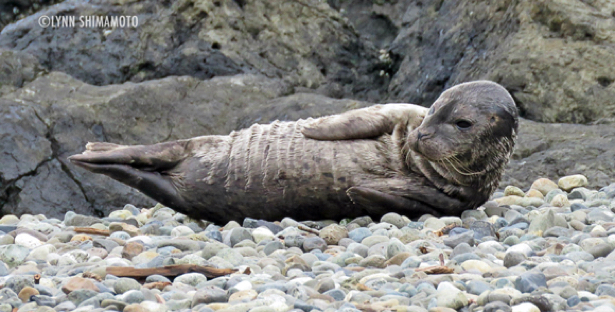 There were numerous other responses during the past week. Weaned pup Booster (above) was seen only one day. First Responder Dori found a woman sitting on log right next to the pup. Dori explained to her the need to move back and give the pup some quiet time to rest. The woman later said she didn’t know anything about pups and very grateful Dori talked to her with such respect. She was quite intrigued about the seal and asked lots of questions when volunteers chatted with her later.
There were numerous other responses during the past week. Weaned pup Booster (above) was seen only one day. First Responder Dori found a woman sitting on log right next to the pup. Dori explained to her the need to move back and give the pup some quiet time to rest. The woman later said she didn’t know anything about pups and very grateful Dori talked to her with such respect. She was quite intrigued about the seal and asked lots of questions when volunteers chatted with her later.
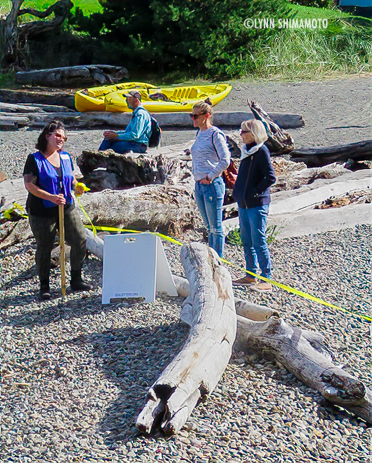 Most harbor seal pups in South Puget Sound are weaned by October 1st and by October 15th all pups will be entirely on their own, struggling to find safe places to rest. The damp and colder Fall months are especially tough on these newly-weaned pups who need to build up immunity to ward off parasites and disease. Pups generally lose half their body weight in the first two weeks after weaning. Low body weight and stress makes them even more vulnerable to health issues.
Most harbor seal pups in South Puget Sound are weaned by October 1st and by October 15th all pups will be entirely on their own, struggling to find safe places to rest. The damp and colder Fall months are especially tough on these newly-weaned pups who need to build up immunity to ward off parasites and disease. Pups generally lose half their body weight in the first two weeks after weaning. Low body weight and stress makes them even more vulnerable to health issues.
Seal Sitters depends on our great volunteers like Kat (photo left) to educate the public - and help pups rest undisturbed to have the best chance possible not only to survive, but to thrive. Thanks to the many volunteers who kept these pups safe.
 On one day alone, Seal Sitters First Responders scrambled to protect three young seals who were onshore. While one was resting at the far southern reaches of West Seattle in Lincoln Park, another, nicknamed Cutie, was found miles away lying in the middle of the boat ramp, just feet from a truck backing up with a trailer (photo above).
On one day alone, Seal Sitters First Responders scrambled to protect three young seals who were onshore. While one was resting at the far southern reaches of West Seattle in Lincoln Park, another, nicknamed Cutie, was found miles away lying in the middle of the boat ramp, just feet from a truck backing up with a trailer (photo above). Because the pup was not intimidated and frightened off by the size and activity of the vehicles, we were concerned the weaner might have health issues. Dr. Greg Frankfurter of SR3 arrived to assess the pup who then scooted back into the water. A tired and cold pup is often not alert and usually more than reluctant to leave shore. Boaters, please be cautious when launching at ramps this time of year. Pups are always looking for easy access places to doze; sadly, each season it seems a pup is run over and killed - or has to be euthanized from horrific injuries.
Meanwhile, yet another pup named Zeus hopped out briefly onto the north ramp at the same location. Zeus later perched on nearby rocks and rested there throughout the evening. First Responder David found people at 9pm looking for Zeus with a flashlight and someone climbing down the rocks. He reminded them that people are to stay far back from resting seals and that a startled, scared pup could be seriously injured in a fall trying to escape. Please let seals be and share the shore!
Earlier in the week, seal pup Sprinter tried to get some rest and warmth on several busy public beaches. Seal Sitters watched over him/her whenever onshore, but the crowds and activity kept the pup on the move. One day as Sprinter lay below the Alki seawall, volunteers were horrified to watch a kayaker's unleashed dog make a beeline for the seal pup. Thankfully, Sprinter was able to escape safely into the water.
A number of days later, Seal Sitters noticed that Sprinter seemed to be in decline with possible ear and respiratory infections. He was captured by Seal Sitters First Responders and transferred to SR3’s marine mammal rehab facility in Des Moines. The veterinary team was initially guarded about Sprinter’s chances, so they were delighted when he suddenly ate a whole fish. The pup continues to recover. A Seattle Times photographer captured the rescue efforts and you can view photos here.
 There were numerous other responses during the past week. Weaned pup Booster (above) was seen only one day. First Responder Dori found a woman sitting on log right next to the pup. Dori explained to her the need to move back and give the pup some quiet time to rest. The woman later said she didn’t know anything about pups and very grateful Dori talked to her with such respect. She was quite intrigued about the seal and asked lots of questions when volunteers chatted with her later.
There were numerous other responses during the past week. Weaned pup Booster (above) was seen only one day. First Responder Dori found a woman sitting on log right next to the pup. Dori explained to her the need to move back and give the pup some quiet time to rest. The woman later said she didn’t know anything about pups and very grateful Dori talked to her with such respect. She was quite intrigued about the seal and asked lots of questions when volunteers chatted with her later.
Seal Sitters depends on our great volunteers like Kat (photo left) to educate the public - and help pups rest undisturbed to have the best chance possible not only to survive, but to thrive. Thanks to the many volunteers who kept these pups safe.
A Tale of Two Cuties
Sep/10/21 08:55 AM
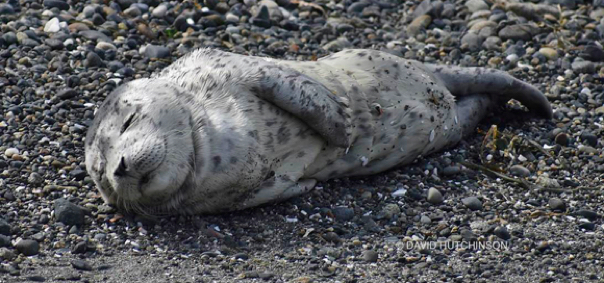 "It was the best of times, it was the worst of times . . .” for two young harbor seal pups.
"It was the best of times, it was the worst of times . . .” for two young harbor seal pups.The situation looked dire for two orphaned harbor seal pups who arrived on West Seattle beaches in August. Emaciated and abandoned, their chance of survival was poor until they were found by beachgoers who called the Seal Sitters hotline (206-905-SEAL).
The first pup appeared below the Alki Beach promenade at 11 one morning (photo above). Seal Sitters First Responder Suzanne quickly set up tape and signs, alerting several people walking their dogs on the beach. With the help of scheduler Karin, volunteers Anais and Malloree and fellow responders David H, John M and Jay H, Suzanne was able to monitor the pup’s condition.
It was clear the very young pup, nicknamed Cascade, would not survive another day on her own, so the pup was taken to SR3’s marine mammal hospital. SR3 Veterinary Nurse Casey reported that the pup tried to suckle on the transport kennel and still had an umbilical stump.
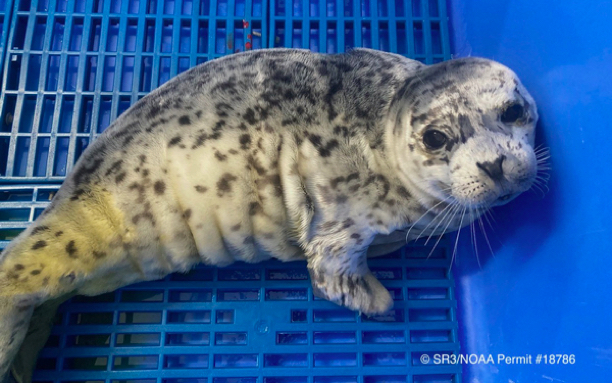 Cascade received oral and subcutaneous fluids for stabilization and rehydration and quickly began to improve. The photo shows Cascade under care at SR3 rehab facility. At last report, she was doing well.
Cascade received oral and subcutaneous fluids for stabilization and rehydration and quickly began to improve. The photo shows Cascade under care at SR3 rehab facility. At last report, she was doing well.A SECOND NEWBORN KEEPS SEAL SITTERS BUSY
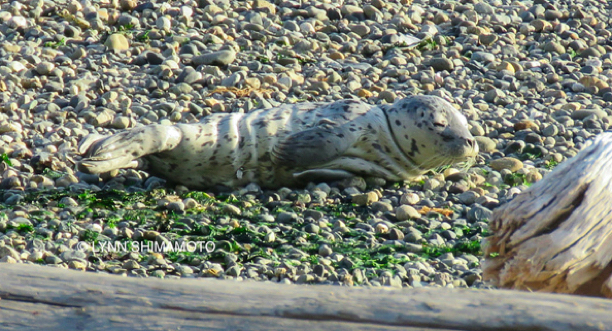 Two days after Cascade’s rescue, a second pup was reported at West Seattle’s Lincoln Park. Reporting Party Jen and her companions were enjoying a late summer evening on the beach when they noticed a tiny seal haul out of Puget Sound, only 100 feet away. They stayed to watch over pup Piccolo until First Responder Lynn arrived. Piccolo was estimated to be a nursing aged pup at 2-3 weeks old, with no hope of surviving on her own since she was dependent on her mother’s rich milk. In the hope that the pup could reunite with her mom, she was left on the beach, surrounded by a yellow tape perimeter to keep people away.
Two days after Cascade’s rescue, a second pup was reported at West Seattle’s Lincoln Park. Reporting Party Jen and her companions were enjoying a late summer evening on the beach when they noticed a tiny seal haul out of Puget Sound, only 100 feet away. They stayed to watch over pup Piccolo until First Responder Lynn arrived. Piccolo was estimated to be a nursing aged pup at 2-3 weeks old, with no hope of surviving on her own since she was dependent on her mother’s rich milk. In the hope that the pup could reunite with her mom, she was left on the beach, surrounded by a yellow tape perimeter to keep people away. The next morning, Lynn found Piccolo at the same spot. The pup swam away and was later sighted on nearby private beaches. Residents put up makeshift barriers to protect her and reminded their neighbors to keep dogs away. When the pup returned to Lincoln Park, Seal Sitters volunteers Corinne, John M and Victoria talked with the public while Lynn captured Cascade. Shortly after assisting with the capture, John S delivered her safely to the SR3 hospital. Quickly stabilized, Piccolo responded well to treatment (Piccolo is shown below with identifying tag at SR3 rehab facility).
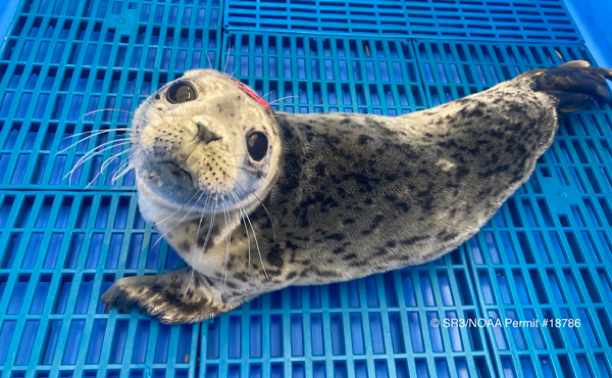
We will never know how the pups became separated from their mothers. Seal Sitters is grateful to the members of the public who found these two orphans in time for them to be protected and given a second chance. Hopefully, it’s the best of times for Cascade and Piccolo.
First seal pup of the season delights onlookers
Aug/21/21 08:34 AM
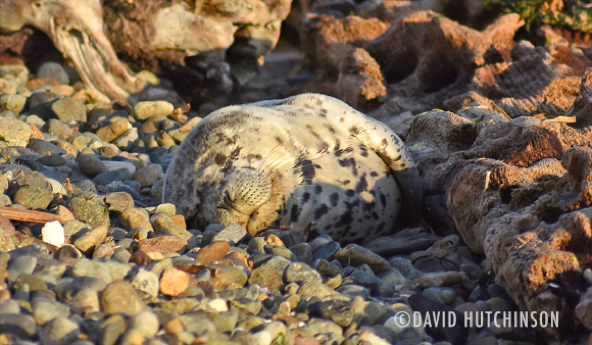 After responses to several dead newborn seal pups and a harbor porpoise calf over the past weeks, Seal Sitters MMSN First Responders have been anxiously awaiting the arrival of our first live pup of the 2021 season.
After responses to several dead newborn seal pups and a harbor porpoise calf over the past weeks, Seal Sitters MMSN First Responders have been anxiously awaiting the arrival of our first live pup of the 2021 season.That day finally arrived on Thursday. Around 1:30 in the afternoon, Seal Sitters Hotline Operator Nanda fielded a report of a seal pup onshore at Lincoln Park near Colman Pool. She relayed the info to First Responders Suzanne and Dave and off they headed to investigate. While Dave parked the car, Suzanne made her way down the beach just in time to see the pup get jostled by a large wave and swim off into Puget Sound.
Suzanne’s brief glimpse and subsequent chat with the reporting party and daughter, who had been sitting quietly watching seal, determined that it appeared healthy and alert, with no apparent injuries nor signs signs of trouble breathing. They had kept people away from the seal and had even established a small boundary with logs. Suzanne did explain to them that they had been sitting much too close, but complimented them on being so helpful and for calling our hotline.
Later in the afternoon, the hotline received a second report of a seal on the Lincoln Park beach, but a bit further south. When First Responder Lynn got to the site around 3pm, a film crew working in front of the picnic shelters directed her to the tiny seal, sleeping nestled alongside the driftwood (photo above). The pup’s spotted coat provided incredible camouflage on the pebbled beach. Seal Sitters Scheduler Abigail called volunteers Brittany, Cathy, Jill and Irene, who arrived in shifts and were kept busy pointing the pup out to the many beachgoers, answering questions, tweaking the yellow perimeter tape and keeping an eye on unleashed dogs. Brittany (shown below in blue volunteer vest) named the pup Xico - pronounced Chico.
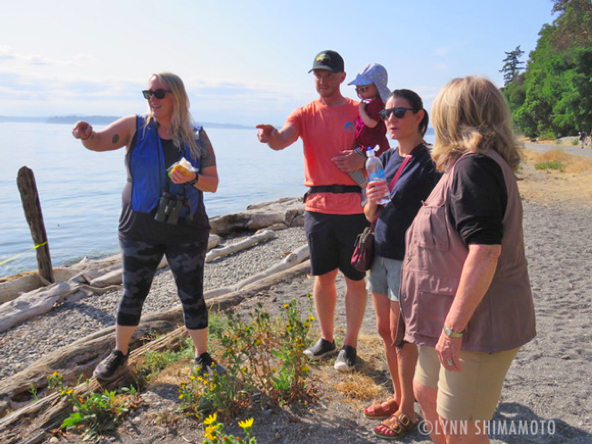 Xico went into the water at 8:15p, straight towards the sun setting over the Olympics and the end to a perfect day at the beach. Many thanks to all the first responders and volunteers who kept Xico safe over the course of a long day.
Xico went into the water at 8:15p, straight towards the sun setting over the Olympics and the end to a perfect day at the beach. Many thanks to all the first responders and volunteers who kept Xico safe over the course of a long day. How thrilling to have a beautiful new seal pup to protect! We’ve all missed the camaraderie of hanging out with fellow volunteers and the public. Please, if you see a seal - or other marine mammal - on the beach, call Seal Sitters Hotline asap @ 206-905-7325 (SEAL). And for the safety of all wildlife, respect that dogs (leashed or unleashed) are not allowed on public beaches.
Boating season collides with seal pupping season
Jul/24/21 10:56 AM
Last week, Seal Sitters MMSN First Responders Victoria and John investigated the report of a dead harbor seal pup rolling in the surf on a private beach. The tiny pup was a newborn with umbilical cord still attached. They transported the pup to marine mammal rehab facility SR3 in Des Moines for a necropsy to determine cause of death.
SR3 Veterinarian Greg Frankfurter reported back that the pup was a neonatal female in good body condition. The pup had recently nursed as there was food in the stomach. He reported that the cranium was “shattered” and disarticulated from the spine. His conclusion was that it was “most likely…from a boat given the highly focused high force trauma.” Thankfully, the pup probably did not suffer since “loss of consciousness was likely immediate.”
Recently, another newborn was struck and killed by a boat motoring at a Central Puget Sound marina.
PLEASE BE ON THE LOOKOUT
Seal Sitters would like to remind boaters to be on high alert this time of year. What may appear to be a small log drifting on the surface of the water could easily be a dozing harbor seal pup. Seal moms often give birth on docks and at marinas and can be seen swimming nearby. Please, always motor cautiously.
Additionally, if you are moored in a bay or marina for any length of time or overnight, make sure to check your transom before leaving the area for your next destination. Tired seal pups are always looking for an easy spot to rest. Moving a nursing seal pup out of the area, away from his or her mom, would truly be a death sentence for the newborn. If you find a pup sleeping on your transom and you need to sail, if your presence alone doesn’t encourage the pup to leave, very gently use a paddle to scoot the hitchhiker off and into the water.
SR3 Veterinarian Greg Frankfurter reported back that the pup was a neonatal female in good body condition. The pup had recently nursed as there was food in the stomach. He reported that the cranium was “shattered” and disarticulated from the spine. His conclusion was that it was “most likely…from a boat given the highly focused high force trauma.” Thankfully, the pup probably did not suffer since “loss of consciousness was likely immediate.”
Recently, another newborn was struck and killed by a boat motoring at a Central Puget Sound marina.
PLEASE BE ON THE LOOKOUT
Seal Sitters would like to remind boaters to be on high alert this time of year. What may appear to be a small log drifting on the surface of the water could easily be a dozing harbor seal pup. Seal moms often give birth on docks and at marinas and can be seen swimming nearby. Please, always motor cautiously.
Additionally, if you are moored in a bay or marina for any length of time or overnight, make sure to check your transom before leaving the area for your next destination. Tired seal pups are always looking for an easy spot to rest. Moving a nursing seal pup out of the area, away from his or her mom, would truly be a death sentence for the newborn. If you find a pup sleeping on your transom and you need to sail, if your presence alone doesn’t encourage the pup to leave, very gently use a paddle to scoot the hitchhiker off and into the water.
Boaters, please stay back from seals
Jul/20/21 08:02 AM
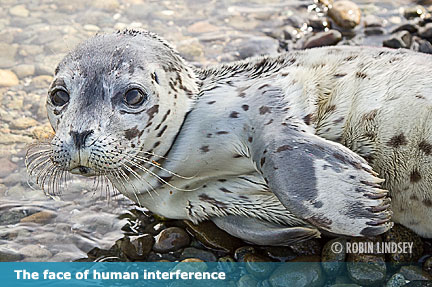
Harbor seal haulouts are full of pregnant females and newborn pups in Puget Sound and pups can be found all along the Washington coastline and inland waterways. Harbor seals also use jetties, breakwaters and log booms for haulouts.
Please stay a minimum of 100 yards away from resting seals. Like all marine mammals, they are protected from harassment by the Marine Mammal Protection Act and Washington State law RCW 77.15.130 (a criminal misdemeanor, mandatory court appearance, punishable with up to 90 days in jail and up to $1000 fine).
Pups pay a terrible price for human disturbance. The pup shown above was found in 2012, starving on Cutts Island, along with two other emaciated pups and several dead ones. All had been abandoned by their mothers because boaters disrupted the seal colony on this small island near Gig Harbor. A day of boating fun for people can be a death sentence for seal pups. During boating season, thousands of boats can be moored offshore at Cutts disrupting this historic harbor seal haulout (called a “rookery” during pupping season).
If you find a spot for your picnic on a beach near a harbor seal, please move your picnic to another beach. There are reports of people with blankets and coolers surrounding a lone seal pup - finally calling the stranding network wondering why the mother did not return. A harbor seal mom, shy and wary of humans, will abandon her pup if people and dogs are around! Use common sense and help protect wildlife from harassment.
If you are boating, kayaking, or on your paddle board, please stay far away from resting harbor seals. In 2010, we documented a speeding boat intentionally flushing seals from a protected island rookery with a sign posted “closed harbor”. In the photo below, you can see the boat scaring hundreds of seals from the beach, including pregnant females and many newborn pups. A female was giving birth right at that very moment and, terrified, she left her newborn pup, still in a bloody birth sac, alone on the deserted beach. The mom had no time to memorize the scent or call of her pup, which often leads to abandonment. Thankfully, a full 20 minutes after the boat left with the people onboard laughing, the mom returned to nurse her pup. More often than not, that pup would have been abandoned and slowly starved to death.
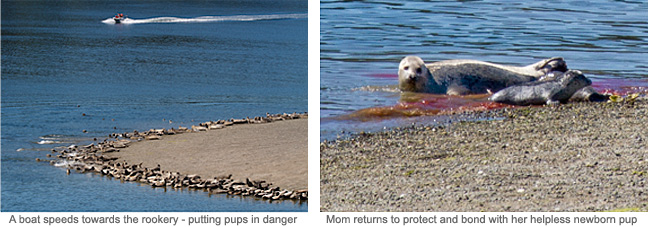
It is not a laughing matter to harass seals. It is a matter of life and death for seal pups. This incident was investigated by NOAA’s Office for Law Enforcement. Harassment is not just poking with sticks (yes, we have witnessed that) or scaring an animal back into the water - any change in an animal’s behavior caused by your presence is considered a “take” by law. This Federal law also prohibits touching, moving and feeding seal pups.
Many state parks on islands in the San Juans, Central and South Puget Sound have harbor seal rookeries. Do not approach animals by boat or by land. Please, be respectful and move your party elsewhere. If you see a violation, please call NOAA Office for Law Enforcement: 1-800-853-1964 and your local stranding network.
Boat launches and docks can have newborn or weaned pups sleeping on them or nearby, often in danger from propeller strikes or being run over by boat trailers. In some coastal areas, people are allowed to drive vehicles on the beach itself. On July 4th weekend in 2011, a pup was run over and killed on the beach at Washington’s Ocean Shores - other animals, sick or weak and unable to move quickly, have been run over at Westport (California sea lion pup), Long Beach Peninsula (California sea lion), and Twin Harbors (adult harbor seal) at different times of the year. Please immediately report any pup (or adult) that is at a dangerous location or being harassed to your local stranding network.
Please be aware of your surroundings and give our resident marine mammals a break this summer and fall. Respect that harbor seals need to rest and nurse. Recreate responsibly and you just might save the life of a seal pup. Fireworks are a moment’s thrill that can have heartbreaking consequences for wildlife.
Seal rescued from Alki Beach, but doesn't make it
May/27/21 04:58 PM
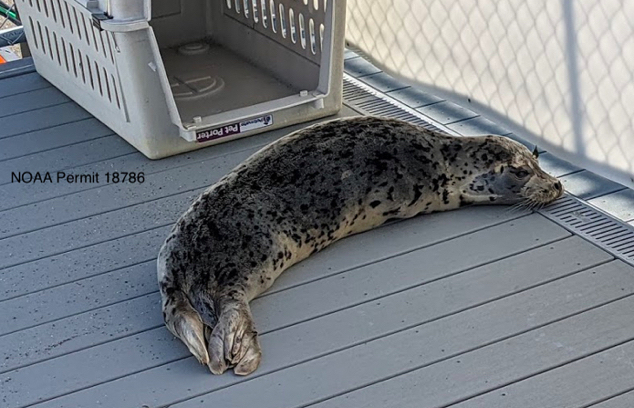
Dr. Greg suspected a neurological impairment from injury or infection, and the only way to find out was to examine the seal. The female seal was extremely lethargic until captured, when she spun about and tried to bite her rescuers. She was safely placed in a crate and transported to the rehab clinic.
The seal was nicknamed “Una” as she was the first patient at SR3’s newly-opened marine wildlife hospital in Des Moines. An exam showed she was a juvenile, probably 2-3 years old and not yet of reproductive age. X-rays revealed no signs of trauma such as broken bones. Una was treated for suspected protozoal infection and pain and seemed to be resting comfortably at SR3 (photo above).
Unfortunately Una passed away during her second night in care. A necropsy was performed; we hope the lab results will tell us what led to Una’s death.
May celebrates moms of all species
May/14/21 09:57 AM
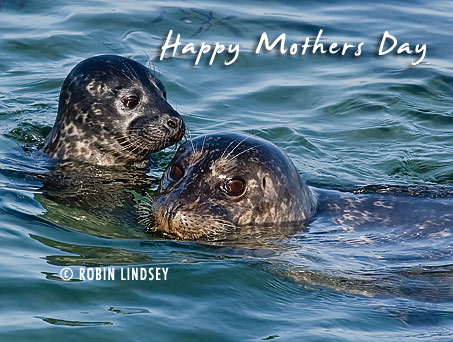
This is a reminder, too, that spring is the time for birthing of many wildlife species. Harbor seal pupping season is now underway on Oregon and Washington’s outer coast. Share the Shore - stay back and do not disturb!To view a map which show the pupping season timeline of all coastline in Oregon and Washington, click here.
Harbor seal moms form affectionate bonds with their pups. Immediately after birth (see birth photos here), a mom must memorize the scent and call of her newborn so she can locate the pup if they are separated. Pups weigh between 18-30 lbs when born. Mom will nurse her pup for 4-6 weeks and then the chubby pup is on his own - now gaunt from nourishing her pup, she needs to replenish her own fat stores. During that short time, she must teach her pup all the skills to survive against daunting odds - only 50% of pups survive the first year.
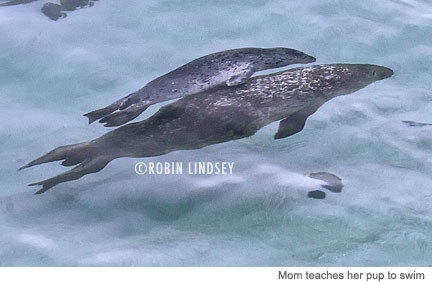
Sometimes, a mom will leave her pup, who may not have the strength to swim for long periods, alone to rest on shore. She returns later to nourish her hungry pup. Always stay back from a resting pup. Otherwise, the mom may abandon her young due to human interference. If you have concerns, contact your local Marine Mammal Stranding Network.
And finally, a “shout-out” to our Seal Sitters volunteers who are moms. These great women teach their children that respect for wildlife and concern for the health of our waterways is an empowering lesson to be learned and shared with others. We cannot thank you enough for your passion.
Dec/25/20 08:20 AM
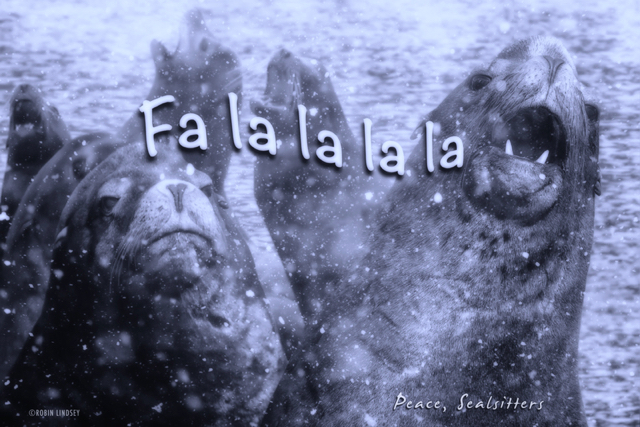 Seal Sitters wishes you a wonderful holiday and a peaceful and healthy 2021.
Seal Sitters wishes you a wonderful holiday and a peaceful and healthy 2021.This past year has been especially challenging. We hope that next year will bring some normality of volunteer camaraderie while protecting the wildlife we love. Many of the friendships developed on the beach will truly last a lifetime - we miss seeing our volunteers and interacting with the public.
A rash of sea lion shootings throughout the Fall and into the holiday season has once again marred the end of the year. We post this photo of a sea lion “chorus” as a reminder of the joyful and gregarious nature of these magnificent marine mammals.
Shot sea lion numbers end bleak year
Dec/24/20 09:15 AM
2020 has been a tough one on so many levels for Puget Sound’s marine mammal stranding networks.
The unlawful and rampant shootings of sea lions has ended the year on a frustrating, infuriating and tragic note. At last count, out of 23+ sea lion carcasses since Fall, there have been 14 confirmed shot dead. Three additional carcasses are pending radiographs, along with another 2 highly suspect deaths. Others were unable to be examined due to location. Several additional sea lion carcasses have been sighted floating in Elliott Bay, but disappeared before the networks were notified and able to respond.
Sea lions and seals are unwitting and unjustified scapegoats for dwindling fish stocks; the annual rash of shootings typically corresponds with fish runs and fishing seasons.
The unlawful and rampant shootings of sea lions has ended the year on a frustrating, infuriating and tragic note. At last count, out of 23+ sea lion carcasses since Fall, there have been 14 confirmed shot dead. Three additional carcasses are pending radiographs, along with another 2 highly suspect deaths. Others were unable to be examined due to location. Several additional sea lion carcasses have been sighted floating in Elliott Bay, but disappeared before the networks were notified and able to respond.
Sea lions and seals are unwitting and unjustified scapegoats for dwindling fish stocks; the annual rash of shootings typically corresponds with fish runs and fishing seasons.
Deadly week as two sea lions confirmed shot
Oct/05/20 05:58 PM
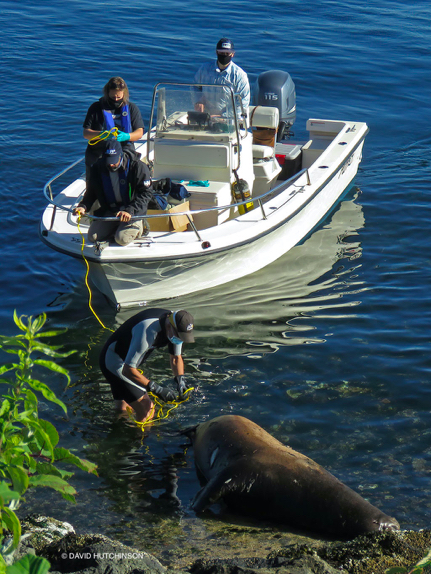 Necropsies performed on two dead California sea lions in West Seattle this week confirmed suspicions that both animals had been shot to death. There have been multiple reports of gunfire this past week in the Duwamish River where fishing boats and nets have been present.
Necropsies performed on two dead California sea lions in West Seattle this week confirmed suspicions that both animals had been shot to death. There have been multiple reports of gunfire this past week in the Duwamish River where fishing boats and nets have been present.On Saturday (10/3) Seal Sitters MMSN facilitated the necropsy of a dead, robust California sea lion found two days earlier, mysteriously tied to a pier in the East Waterway of the Duwamish. The animal was towed ashore to Don Armeni boat launch where an examination was done by SR3 with assistance from Seal Sitters and Sno-King Marine Mammal Response. Numerous pellets were found in his flipper, chest and head, along with massive internal hemorrhaging. The head was taken for radiographs which revealed additional projectiles in the skull.
Earlier in the week, Seal Sitters and SR3 conducted a necropsy on a sea lion that had been found floating offshore. That animal suffered a shattered vertebrae, broken rib and internal organ damage. X-rays showed projectiles in the skull.
Evidence from both examinations will be turned over to NOAA’s Office of Law Enforcement for investigation.
As always, Seal Sitters is extremely concerned about this annual shooting of pinnipeds during fishing seasons. Concurrent with Fall and Winter fish runs, numerous sea lions and seals pay a deadly price. As in past years, guns are being fired over open water in a busy recreational, commercial and industrial area of the City of Seattle. This latest shooting happened directly across from fuel barges and fuel storage tanks, near docks active with workers. Last year, shootings were witnessed in Elliott Bay in ferry and water taxi lanes.
If you hear active gunfire over the water, please call 911. If the gunfire is in Elliott Bay, after calling 911, notify Seal Sitters’ hotline at 206-905-SEAL (206-905-7325). To find out the stranding network for your area of Puget Sound, click HERE.
If you see a stranded marine mammal, dead or alive, in West Seattle, please call Seal Sitters’ hotline at 206-905-SEAL (206-905-7325).
Seal pups relocated to remote island for their safety
Sep/02/20 08:25 AM
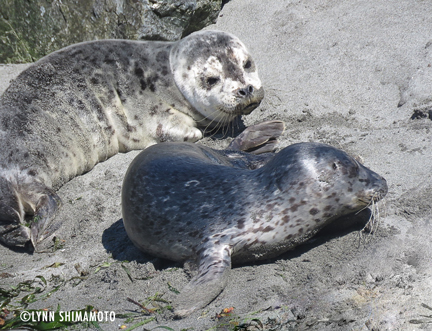
Over the past days, the pups, nicknamed Foxtrot (L) and Tango (R), had been coming and going from the highly visible and accessible public beach next to a popular pier, trying to get much-needed rest. The very busy Alki Trail runs next to that beach along the seawall, with stairs leading directly to the sandy nook the pups were using. Volunteers set up a tape perimeter during daylight and early evening hours when the pups were onshore, but still people were observed crossing the tape to access the beach or look at the seals, despite clearly marked signage.
When Seal Sitters became aware the pups were returning late each night for a few more hours rest, the stairs were blocked off with signboards and tape to protect them. It was obvious, however, that people were breaching the perimeter overnight and going down onto the beach. When Responders checked in the early mornings to see if the animals were on shore, they found commingled seal tracks, human footprints, dog prints, litter and human excrement despite double rows of tape, cones and barriers that had been put across the steps. It is against federal law, the Marine Mammal Protection Act, to harass (disturb, touch, feed, move or otherwise harm) seal pups.
Seal Sitters’s hotline began to receive troubling reports of people touching and harassing the pups, ignoring warnings from passersby and barriers the few times SSMMSN First Responders were not present. Due to COVID restrictions and facemask requirements, Responders are under strict guidelines to have limited contact with the public at a minimum 6 foot distance whenever possible.
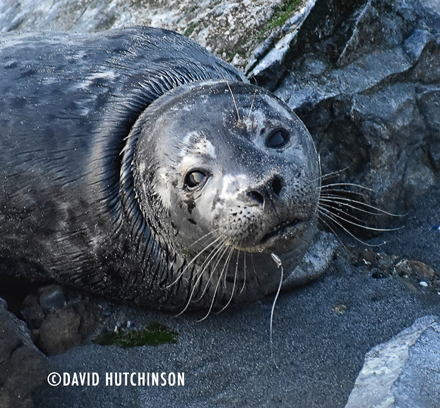
The pups’ proximity to fishing piers and the boat dock made them vulnerable to further entanglement. Seal pups often seek out places with easy fishing. Boat docks and piers are a Mecca for tiny fish - and, unfortunately, also discarded bait and derelict or live line and lures. Several other pups in South and Central Puget Sound have been reported with fishing lures dangling from their mouths, but have yet to be found. Seal pups around fishing piers seldom results in a good ending.
Based on the combined threats of fishing gear entanglement and increased harassment from people, the decision was made to relocate them for their safety.
Seal Sitters First Responders with assistance of SR3 captured the pups Sunday afternoon, just as WDFW Marine Mammal Investigations and World Vets arrived by boat and landed at the point. The pups were quickly transferred and given a medical exam on the boat, where it was learned that Tango also had evidence of a puncture wound from a previous fish hook. After determining their health warranted release rather than rehabilitation, they were taken to a secluded South Sound island. Tango and Foxtrot were tagged with unique ID numbers and marked with green bio paint for easier re-sights in the wild. Seal Sitters is so grateful that the pups could be relocated together in a remote location, far from people. We hope they stay near their new home.
The rescue and relocation on Sunday was yet another example of the tremendous teamwork of Marine Mammal Stranding Networks SSMMSN, WDFW MMI and World Vets and our fantastic support group, SR3. Heartfelt thanks to everyone who gave these two pups a better chance for survival.
The video clip below shows Foxtrot and Tango frolicking in their new waters:
View a more extended video of the rescue and the release into the wild HERE.
SEAL PUPPING SEASON IS IN FULL SWING
Harbor seal pupping season is currently underway in our area and seal pups need to be able to rest onshore. Please remember to stay away from pups, leash your pets, and call Seal Sitters at 206-905-7325 (SEAL) if you see a marine mammal on the beach in West Seattle. For information on who to call in other areas of Washington, click here.
MARINE MAMMAL HARASSMENT NUMBERS RISE
Incidents of marine mammal harassment are up dramatically this season as people flock to be on or near the water, finding local recreational activities instead of travel to other areas. Boat sales - and all watercraft including kayaks and paddle boards - are at a record high. Many stores and online sources for fishing gear have depleted stocks, if any. Beaches are packed with people.
Illegal selfies with seal pups are on the increase. Seals are being flushed from rookeries, separating moms from their pups. A number have been victims of boat strikes. Boaters are pursuing orcas far too closely, putting them in danger and compromising their ability to forage. Many of these people are not familiar with the Federal law that protects marine mammals and require mandated distances and guidelines to keep them safe from harassment and harm.
If you witness a marine mammal being harassed onshore or in the water, please report the incident immediately to NOAA’s Office of Law Enforcement (1-800-853-1964) and notify your local stranding network.
Newborn seal pup taken to rehab
Jul/25/20 01:04 PM
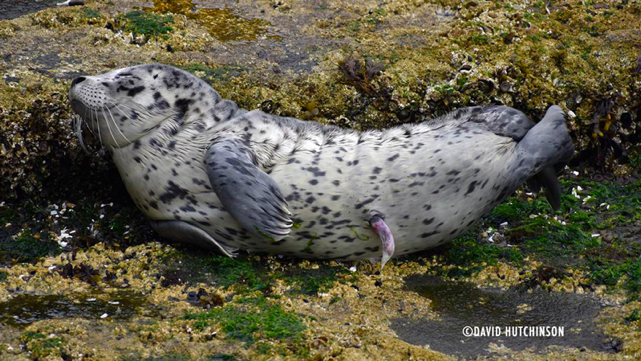
First Responder Jay immediately headed to the site, armed with stranding materials if necessary to keep people back. Upon arrival, he saw a short stub of umbilical cord on the alert pup’s belly. He notified other responders that we had a newborn seal on our urban beach - a scenario that often has a bad outcome. Abandonment is much more likely when people or dogs cause disturbance and frighten a mom away. If a mom has not bonded with her newborn or fears for her own safety, she may not return to nurse the pup, who cannot survive without her.
For the past 5 months, NOAA’s Marine Mammal Stranding Networks have been trying to determine how to respond to and protect animals while abiding with safety considerations and distancing mandates in these COVID times. Seal Sitters’ response area has miles of urban shoreline, almost all accessible to the public for recreation purposes. During this difficult time, our responders have been deliberating the logistics of giving seal pups the protection and rest they need, yet keeping our volunteers and the public safe - all the while trying to keep people at a distance, not only from the pup, but also from each other and discourage assembly. A heady challenge.
That challenge was put to the test Wednesday morning. A quick perimeter of yellow tape emblazoned with “Share the Shore” was established on the sidewalk above the pup and cones were placed on the beach. Fearing that the pup might already have been abandoned, a call was placed to PAWS Wildlife Center to see if they had an open space to accept the pup if necessary. The answer was yes. A second call was made to SR3, a valued non-profit which provides support to the stranding networks. Arrangements were made for their vet to do an on-site visual evaluation of the tiny seal. Based on the length and color of the umbilical cord, the pup was likely only a day old.
Since the seal was alert and assessed to be in relatively good body condition, the decision was made to maintain a low-key volunteer presence to ensure her safety onshore, in hopes the mom might return sometime during the day - or, more likely, in the evening when human activity had quieted down. A pup’s best chance for survival is always with mom. While rehab can fatten up a pup in a small pool, robust enough to be released back into the wild, it cannot teach a pup life skills and how to hunt in the vast waters of Puget Sound. The plan was to capture the pup for transport if the pup’s health declined during the day or if she was still onshore the next morning.
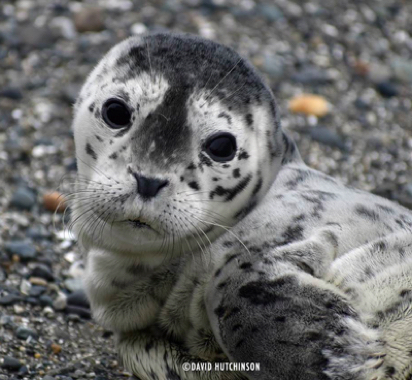
At 5pm, with an ever-encroaching return tide, Echo was forced into the cold waters of Puget Sound. She paddled along the edge the sea wall, trying several times to haul out again, but finally gave up and swam straight out, away from the beach.
Later, she came ashore right in front of the Alki Bathhouse. Resting only briefly after having struggled in the surf, the incoming waves swept over her once more and the exhausted pup again took off. Volunteers scanned the waves, but here was no sign of an adult seal waiting anywhere offshore.
Shortly after 8pm, the hotline received a frantic report that people were throwing rocks at a pup at the end of the public promenade. Seal Sitters arrived within minutes and Echo was already swimming west toward private beach, inaccessible to responders because of the high tide. We guessed that she likely ended up in a particular nook just on the other side of a cement bulkhead. We were optimistic that little Echo might find some peace and rest there for the night, but less optimistic that mom was still around to feed her.
Sure enough, early the next morning the homeowner phoned Seal Sitters Hotline (206-905-SEAL) to say that Echo was on his beach. Based on deteriorating body condition, indicative of the absence of an attending mom, the decision was made to take her to rehab. Echo was captured and transported by SR3 to PAWS rehabilitation facility in Lynnwood.
PAWS reports that the female pup weighs almost 20 pounds and is just under 30 inches long. At intake, Echo was thin and dehydrated, but the hope is that she will do well in rehab. Seal Sitters thanks PAWS for giving this stunning silver pup a chance for survival. A heartfelt thanks goes out to SR3 for their field support and to Seal Sitters’ First Responders and volunteers who protected Echo throughout a long, stressful day.


